|
|
|
Sort Order |
|
|
|
Items / Page
|
|
|
|
|
|
|
| Srl | Item |
| 1 |
ID:
090219
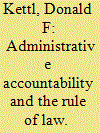

|
|
|
|
|
| Publication |
2009.
|
| Summary/Abstract |
In June 2008, the U.S. Food and Drug Administration rocked the food industry-and food lovers-with its warning about tainted tomatoes. Consumers in New Mexico and Texas were contracting a rare, sometimes fatal strain of salmonella and the FDA feared that salmonella contamination from tomatoes was the cause. In the weeks that followed, a major outbreak spread across the country and worried consumers abandoned tomatoes. Fourth of July cookouts were not the same, and BLT lovers complained that their favorite sandwich was impossibly dry. By the end of July, the outbreak had infected more than 1,200 persons in 42 states.
|
|
|
|
|
|
|
|
|
|
|
|
|
|
|
|
| 2 |
ID:
126041
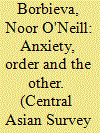

|
|
|
|
|
| Publication |
2013.
|
| Summary/Abstract |
Neither well-being nor suffering can be understood without understanding how the two experiences are related. In this paper, the author focuses on the experiences of well-being and suffering in everyday, mundane contexts, such as food preparation, cleaning and hospitality. Data presented are drawn from fieldwork conducted among ethnic Kyrgyz and Uzbeks in southern Kyrgyzstan, shortly after independence. The author discusses how the experiences of well-being and suffering are informed by symbolic systems that are linked to religious beliefs. This examination contributes to an understanding of the power of religious symbols, arguing that the expectations of well-being or suffering make systems of religious symbols more compelling.
|
|
|
|
|
|
|
|
|
|
|
|
|
|
|
|
| 3 |
ID:
105337
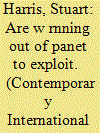

|
|
|
|
|
| Publication |
2011.
|
| Summary/Abstract |
Many people have begun to concern about the potential resources shortages against the backdrop of rapid economic growth. Paul Krugman wrote an article titled 'Running out of Planet to exploit', and in this article, the author will address the Krugman question, and to consider whether the key factor is the decision-making capacity of the international community in dealing with and adapting to the substantial interactions between energy, land, water, and food supply, and the potential global resource scarcities in these four areas-the links and limits in the paper's title.
|
|
|
|
|
|
|
|
|
|
|
|
|
|
|
|
| 4 |
ID:
105002
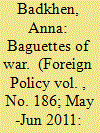

|
|
|
|
|
| Publication |
2011.
|
| Summary/Abstract |
In Egypt, Tunisia, and Yemen, men demonstrated wearing frying-pan basinets. Tin-pot cervellieres. Water-bucket shakos. The green, plastic chain mail of a wastebasket. A young man trussed a rumpled trio of empty water bottles to his head with a swatch of torn bed linen. A protester in Sanaa taped two baguettes and an unleavened pancake of chapati to his skull.
|
|
|
|
|
|
|
|
|
|
|
|
|
|
|
|
| 5 |
ID:
116825
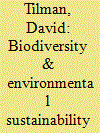

|
|
|
|
|
| Publication |
2012.
|
| Summary/Abstract |
Concern about the loss of Earth's biological diversity sparked two decades of research of unprecedented intensity, intellectual excitement, and societal relevance. This research shows that biodiversity is among the most important factors determining how ecosystems function. In particular, the loss of biodiversity decreases the productivity, stability, and efficiency of terrestrial, freshwater, and marine ecosystems. These research findings come at a time of rapidly increasing threats to global biodiversity resulting from agricultural land clearing, climate change, and pollution caused by globally accelerating demand for food and energy. The world faces the grand, multifaceted challenge of meeting global demand for food and energy while preserving Earth's biodiversity and the long-term sustainability of both global societies and the ecosystems upon which all life depends. The solutions to this challenge will require major advances in, and syntheses among, the environmental and social sciences.
|
|
|
|
|
|
|
|
|
|
|
|
|
|
|
|
| 6 |
ID:
178649
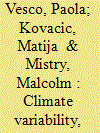

|
|
|
|
|
| Summary/Abstract |
Although substantive agreement exists on the role of climate variability and food scarcity in increasing violence, a limited number of studies have investigated how food resources affect violent conflict. This article explores the complex linkages between climate variability, agricultural production and conflict onset, by focusing on the spatial distribution of crop production in a cross-country setting. We hypothesize that spatial differences in crop production within countries are a relevant factor in shaping the impact of climate variability on conflict in agriculturally -dependent countries. To test this hypothesis, we rely on high-resolution global gridded data on the local yield of four main crops for the period 1982–2015 and aggregate the grid-cell information on crop production to compute an empirical indicator of the spatial concentration of agricultural production within countries. Our results show that the negative impacts of climate variability lead to an increase in the spatial concentration of agricultural production within countries. In turn, the combined effect of climate extremes and crop production concentration increases the predicted probability of conflict onset by up to 14% in agriculturally dependent countries.
|
|
|
|
|
|
|
|
|
|
|
|
|
|
|
|
| 7 |
ID:
129978
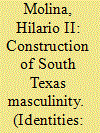

|
|
|
|
|
| Publication |
2014.
|
| Summary/Abstract |
I contend that masculinity formation in South Texas is linked to objects that have been deemed as 'manly'. This study is significant because it examines a group in the US population that, according to census predictions, account for a large percentage of the fastest growing and largest Latino group in the United States. This autoethnography research examines how pico de gallo - a type of salsa - and the barbeque grill assist working-class Mexican American males in constructing a masculine identity known as macho. The data are based on observing 30 social events in the Rio Grande Valley. The findings reveal a pursuit for an apex status of macho through these objects and the cultural transmission of gender roles to the next generation of males. This study concludes by offering suggestions in examining how masculinity, for men of colour, might be linked to marginalisation practices within a social structure.
|
|
|
|
|
|
|
|
|
|
|
|
|
|
|
|
| 8 |
ID:
174488
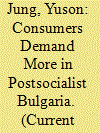

|
|
|
|
|
| Summary/Abstract |
What do consumer rights actually mean in a context in which citizens are unsure whether there is even a functioning judicial system …?
|
|
|
|
|
|
|
|
|
|
|
|
|
|
|
|
| 9 |
ID:
112742
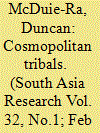

|
|
|
|
|
| Publication |
2012.
|
| Summary/Abstract |
Based on fieldwork, this article examines various aspects of tribal migration from the Northeast frontier of India to Delhi, a phenomenon which increased rapidly in the last half decade or so. This offers insights into four important interlinked processes. First, such migration indicates significant changes taking place in the Northeast itself. While many migrants leave the region to escape conflict, many more simply seek to find work, pursue education and fulfil changing aspirations. Second, tribal migration to Delhi reveals the ways in which the city itself has been changing. While tribal migrants search out employment opportunities in neoliberal capitalist spaces, employers in such spaces have specific reasons to desire tribal labour, particularly in shopping malls and call centres. Third, tribal migrants encounter racism and discrimination in Delhi and their experiences reveal how racial issues function and are debated today within India. Fourth, tribal migrants themselves embody the dramatic discord between the ways tribals see themselves and the ways they are perceived in India.
|
|
|
|
|
|
|
|
|
|
|
|
|
|
|
|
| 10 |
ID:
110606
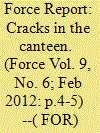

|
|
|
| 11 |
ID:
091724
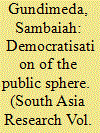

|
|
|
|
|
| Publication |
2009.
|
| Summary/Abstract |
Equality of treatment for all citizens and their cultures in public places is one of the prominent declarations of the secular Constitution of India. The hegemony of Hindu culture in the public sphere, however, reflects a dichotomy between stated declarations and social reality. Placing Dalits at the bottom of the caste hierarchy, if not outside it, 'mainstream' Hindu culture not only marginalised but importantly rejected the Dalits and their culture. This article examines the saga of the demand for a beef stall by the Dalit students in Hyderabad Central University and argues that the rejection of the culture of any community injures the human agency of that community. It is proposed that such injury can be healed only by a dialogical process, involving assertion of positivity and pride in the culture of the injured and positive recognition of such assertion by the injurer. Democratisation of the public sphere can be actualised by according representation to marginalised cultures, but in addition such representation needs to be accompanied with respect.
|
|
|
|
|
|
|
|
|
|
|
|
|
|
|
|
| 12 |
ID:
179010
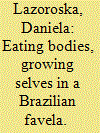

|
|
|
|
|
| Summary/Abstract |
The economic growth of Brazil in the early and mid-2000s has created opportunities for people like my interlocutors, the young and media-savvy residents of Brazilian favelas to consume and partake in a global market of the production of the self. These have nourished their pursuit for both diversity and difference and shaped the eclectic qualities of their consumption practices. In its plural forms, consumption, or eating, which will take center stage in this article, has enabled an expanded palette and palate of being, acting and relishing life in the favela. I argue that eating can be understood as a method of becoming; it can be used as an active attempt at asserting agency over one’s body and, by extension, at asserting subjectivity in a lifeworld open to multiple dimensions of uncertainty and insecurity.
|
|
|
|
|
|
|
|
|
|
|
|
|
|
|
|
| 13 |
ID:
031322
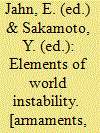

|
|
|
|
|
| Publication |
Frankfurt, Campus Verlag, 1981.
|
| Description |
389p
|
|
|
|
|
|
|
|
|
|
|
|
Copies: C:1/I:0,R:0,Q:0
Circulation
| Accession# | Call# | Current Location | Status | Policy | Location |
| 021593 | 327.1720014/SAK 021593 | Main | On Shelf | General | |
|
|
|
|
| 14 |
ID:
139462
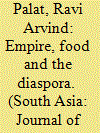

|
|
|
|
|
| Summary/Abstract |
Despite being called ‘Indian restaurants’, the family-run curry houses that are characteristic of high streets in Britain are primarily run by Bangladeshi and Pakistani migrants. This article links the evolution of these restaurants in Britain to colonial history, migration after Independence and contemporary political changes. It analyses the popularity of curry houses alongside the continuing racism meted out to the wait staff and patrons by white Britons in the context of colonial history, migration patterns and the changing industrial fortunes of India and Britain in the post-World War II era. The emergence of wealthy and highly-credentialed Indians and British-born Asians has led to the rise of upmarket eateries and to a sharp bifurcation in diasporic communities.
|
|
|
|
|
|
|
|
|
|
|
|
|
|
|
|
| 15 |
ID:
141256
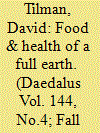

|
|
|
| 16 |
ID:
141563
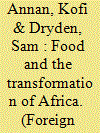

|
|
|
|
|
| Summary/Abstract |
In recent years, African agricultural policies have been haphazard and inconsistent. Some countries have neglected smallholders in favor of commercial farmers. Others have given them attention but focused narrowly on increasing their productivity. African farms’ harvests are indeed much smaller than harvests elsewhere, so increasing productivity is important. But agriculture is about more than yields. A vast food system spreads beyond farm and table to touch almost every aspect of life in every society. Making that system in Africa as robust as possible will not merely prevent starvation. It will also fight poverty, disease, and malnutrition; create businesses and jobs; and boost the continent’s economies and improve its trade balances .
|
|
|
|
|
|
|
|
|
|
|
|
|
|
|
|
| 17 |
ID:
178187
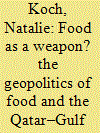

|
|
|
|
|
| Summary/Abstract |
On 4 June 2017, Qatar was suddenly put under an embargo by its regional neighbors – an effort spearheaded by Saudi Arabia and the UAE, who cut off most of its existing land, sea, and air traffic routes. With no domestic agriculture to speak of, Qatar’s external logistics networks are essential for maintaining its food supply. The country’s 2.6 million residents, many of whom flooded the grocery stores, were understandably concerned about their ability to secure food when news about the embargo broke. Eventually, new food supply chains were established, primarily with the assistance of partners in Iran and Turkey. The ongoing rift between Qatar and its neighbors in the Arabian Peninsula, manifested only in part by this effort to undermine the country’s material supply networks raises a number of questions about an old idea: that of food as a ‘weapon’. This article puts this concept in historical and regional perspective in the Arabian Peninsula through the lens of critical geopolitics, tracing the securitizing discourses about food security and their intertwining with narratives about territorial sovereignty, nationalism, and essentialist understandings of geography to explain the causes and effects of the food embargo in the ongoing Qatar–Gulf rift.
|
|
|
|
|
|
|
|
|
|
|
|
|
|
|
|
| 18 |
ID:
141257
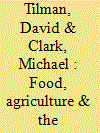

|
|
|
|
|
| Summary/Abstract |
Secure and nutritious food supplies are the foundation of human health and development, and of stable societies. Yet food production also poses significant threats to the environment through greenhouse gas emissions, pollution from fertilizers and pesticides, and the loss of biodiversity and ecosystem services from the conversion of vast amounts of natural ecosystems into croplands and pastures. Global agricultural production is on a trajectory to double by 2050 because of both increases in the global population and the dietary changes associated with growing incomes. Here we examine the environmental problems that would result from these dietary shifts toward greater meat and calorie consumption and from the increase in agricultural production needed to provide this food. Several solutions, all of which are possible with current knowledge and technology, could substantially reduce agriculture's environmental impacts on greenhouse gas emissions, land clearing, and threats to biodiversity. In particular, the adoption of healthier diets and investment in increasing crop yields in developing nations would greatly reduce the environmental impacts of agriculture, lead to greater global health, and provide a path toward a secure and nutritious food supply for developing nations.
|
|
|
|
|
|
|
|
|
|
|
|
|
|
|
|
| 19 |
ID:
043336
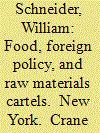

|
|
|
|
|
| Publication |
New York, Crane Russak & company Inc., 1976.
|
| Description |
ix, 122p.
|
| Series |
Strategy paper; no.28
|
| Standard Number |
0844809225
|
|
|
|
|
|
|
|
|
|
|
|
Copies: C:1/I:0,R:0,Q:0
Circulation
| Accession# | Call# | Current Location | Status | Policy | Location |
| 022926 | 327.1110973/SCH 022926 | Main | On Shelf | General | |
|
|
|
|
| 20 |
ID:
141259


|
|
|
|
|
| Summary/Abstract |
The dual burden of obesity and undernutrition is a significant public health challenge worldwide, especially in the context of a changing climate. This essay presents the most recent nutritional evidence for the optimal diet for long-term health, and offers some commentary on how production of these foods affects the environment. Current dietary research supports a diet rich in fruits and vegetables; nuts, legumes, fish, and some poultry as protein sources; unsaturated fats replacing saturated fats; whole grains replacing refined grain products; dairy foods in low to modest amounts; and minimal amounts of red meat and added sugar. This healthy dietary pattern also supports sustainable agriculture and environmental preservation.
|
|
|
|
|
|
|
|
|
|
|
|
|
|
|
|
|
|
|
|
|